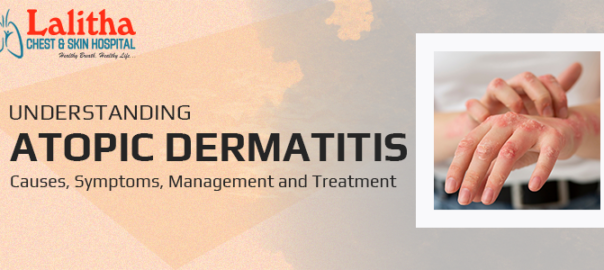Atopic dermatitis, commonly called eczema, is a chronic skin condition affecting millions of people worldwide. Characterized by itchy, inflamed skin, this condition can significantly impact a person’s quality of life.
According to Dr. B. Jyothi, the best skin specialist in Karimnagar, the exact cause of this condition remains unclear but is believed to result from a combination of genetic, environmental, and immune system factors.
With insights from Dr. B. Jyothi, renowned for providing the best treatment for atopic dermatitis in Karimnagar, this blog aims to enhance your understanding of the condition by exploring its causes, symptoms, and available treatment options. Keep reading to learn more.
What causes Atopic Dermatitis?
The development of atopic dermatitis is influenced by several factors, including:
- Genetics: A family history of eczema, asthma, or hay fever increases the likelihood of developing atopic dermatitis. Specific genetic mutations can impair the skin’s barrier function, making it more susceptible to irritation and infections.
- Immune System Response: An overactive immune system can cause the skin to become inflamed and overreact to allergens or irritants.
- Environmental Triggers: Common triggers include pollen, dust mites, pet dander, soaps, detergents, and weather changes. Stress and certain foods can also exacerbate symptoms in some individuals.
- Skin Barrier Dysfunction: A weakened skin barrier increases water loss and reduces protection against irritants, allergens, and bacteria.
Symptoms of Atopic Dermatitis?
The symptoms of atopic dermatitis can vary from person to person and may change over time. Common symptoms include:
- Itchy skin: This is the hallmark symptom, often worsening at night.
- Red or inflamed patches: These may appear on the face, neck, hands, feet, or inside the elbows and behind the knees.
- Dry, scaly skin: The affected areas may become thickened or cracked due to chronic scratching.
- Fluid-filled blisters: In some cases, small, oozing blisters may form.
- Darkened or discolored skin: Long-term inflammation can cause areas of hyperpigmentation or hypopigmentation.
Treatment Options for Atopic Dermatitis?
While there is no cure for atopic dermatitis, several treatment options can help manage symptoms and improve skin health:
- Moisturizers and Emollients: Regularly using thick creams or ointments helps restore the skin barrier and prevent dryness. Look for products free from fragrances and irritants.
- Topical Steroids: Corticosteroid creams or ointments are commonly prescribed to reduce inflammation and itching. Use them as directed by a healthcare professional to avoid side effects.
- Calcineurin Inhibitors: Non-steroidal creams like tacrolimus and pimecrolimus help control inflammation and are suitable for sensitive areas such as the face and neck.
- Antihistamines: Oral antihistamines can help manage itching, particularly at night.
- Light Therapy (Phototherapy): Exposure to controlled ultraviolet (UV) light can improve symptoms in moderate to severe cases.
- Systemic Medications: For severe atopic dermatitis, doctors may prescribe oral or injectable medications, such as biologics, to regulate the immune response.
- Lifestyle and Home Remedies:
- Use gentle, fragrance-free cleansers.
- Avoid long, hot showers, which can dry out the skin.
- Wear loose, breathable clothing made of natural fibers.
- Identify and minimize exposure to triggers.
When to See a Doctor for Atopic Dermatitis?
If symptoms persist despite home care or significantly impact daily life, consult a dermatologist. In addition to this any signs of infection, such as increased redness, swelling, or pus, also require medical attention.
Atopic dermatitis is more than just a skin condition; it’s a complex disorder that requires individualized care. By understanding its causes, recognizing its symptoms, and exploring available treatment options, individuals can take control of their condition and minimize its impact.
If you or a loved one are dealing with atopic dermatitis, don’t hesitate to consult a dermatologist for tailored advice and support.
If you are in Karimnagar and looking for an “atopic dermatitis specialist near me,” the best dermatologist for eczema near me, or the best treatment for atopic eczema, consider visiting Lalitha Chest and Skin Hospital. Dr. B. Jyothi, a highly skilled dermatologist with extensive experience managing atopic dermatitis, offers expert consultations and personalized care for this chronic skin condition. For more information or to book an appointment, visit https://lalithachestandskinhospital.com/


